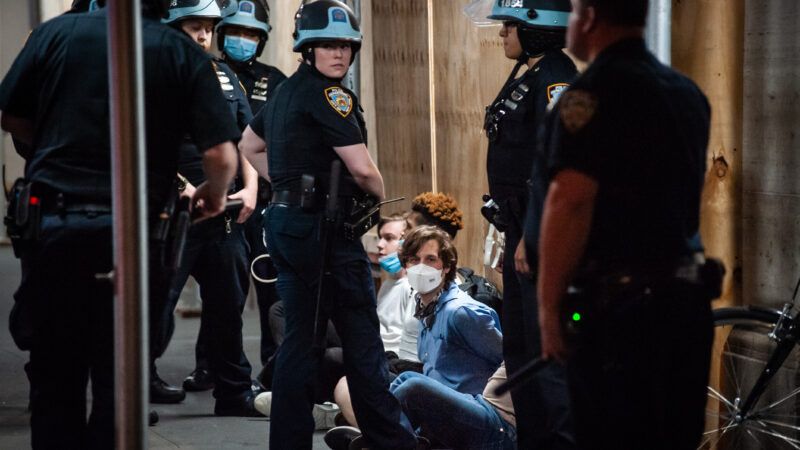Only 3 NYPD Officers Have Been Disciplined for Misconduct During the George Floyd Protests
The NYPD declined to punish nine other officers, despite recommendations from the city's Civilian Complaint Review Board.

More than a year after the George Floyd protests, the New York City Police Department (NYPD) has disciplined just three officers, despite substantiated misconduct findings from the city's Civilian Complaint Review Board (CCRB) against 80 officers.
The CCRB, a police watchdgog, released a data snapshot last week showing that so far it has investigated three-quarters of the 318 complaints lodged against NYPD officers for alleged misconduct during Black Lives Matter protests last summer. Of those, the CCRB has recommended the highest level of discipline, which includes suspension or termination, against 47 officers and less severe discipline for 33 others.
However, the NYPD has only finalized 12 of the substantiated cases. It imposed discipline on three officers and declined to punish nine others.
In a statement to Reason, Sgt. Edward Riley, an NYPD spokesperson, says that "each matter must be looked at individually." Four of the nine sustained allegations, the spokesperson says, involved an incident "where officers under a scaffolding were being pelted with bottles and other objects by a crowd that was screaming epithets and threats while closing in."
"After reviewing the video and the totality of the circumstances, it was the Commissioner's judgement that imposing discipline on officers who were trying to protect themselves did not make sense, nor amount to justice," Riley says.
New York Attorney General Letitia James sued the NYPD in January over its handling of the protests. James' office alleges that NYPD officers beat and pepper-sprayed protesters without justification, performed mass arrests without probable cause, and improperly arrested legal observers and medics.
"There is no question that the NYPD engaged in a pattern of excessive, brutal, and unlawful force against peaceful protesters," James said in a statement announcing the lawsuit.
Several other lawsuits have been filed against NYPD officers for their actions during the protests. Earlier this month, Francisco Casablanca-Torres, who was filmed in a viral video being clubbed by several NYPD officers while trying to cross a crosswalk with his bike, filed a civil rights lawsuit alleging excessive force.
https://twitter.com/joshfoxfilm/status/1268366550475603969
According to the lawsuit, Casablanca-Torres was arrested and issued a summons for violating New York City Mayor Bill de Blasio's curfew order. The criminal case against him was allegedly dismissed. His bicycle was confiscated and never returned to him, the lawsuit says.
The CCRB is currently advocating to be allowed to make decisions on what type of discipline officers should face when it substantiates claims against them. The NYPD commissioner holds final power over disciplinary decisions.
CCRB Chair Fred Davie said in a press statement that the NYPD's failure to discipline officers for misconduct during the George Floyd protests was yet another reason the CCRB should have the power to impose punishment.
"If this continues, the CCRB's work to increase accountability for the people of New York will be nullified," Davie said. "It is critical that members of service who are found guilty of misconduct face consequences. This is another example of why the CCRB should have final authority over CCRB cases."
New York City has been slowly increasing the powers of the CCRB, although not as quickly or expansively as civil liberties advocates would like. This month the New York City Council voted to allow the CCRB to launch its own investigations into police misconduct, and earlier this year the CCRB began investigating instances of sexual misconduct as well. In the wake of the George Floyd protests, the New York State Legislature also repealed a notorious police secrecy law that had kept misconduct records hidden for four decades.
New York City Police Commissioner Dermot Shea defended the actions of officers in June, praising their "incredible amount of restraint" and saying he was "proud of their performance in policing these protests, ending the riots and upholding the rule of law."
Overall, the CCRB has substantiated roughly a third of the complaints it has investigated against NYPD officers for misconduct during the George Floyd protests.
However, it was unable to identify the officers, leading to another third of cases being closed for lack of evidence. The CCRB noted in its press release that it faced "unprecedented challenges in investigating these complaints" due to officers covering their names and badge numbers, officers wearing protective equipment that did not belong to them, failing to properly use their body worn cameras, as well as "incomplete and severely delayed paperwork."
The NYPD did not immediately return a request for comment.


Show Comments (33)